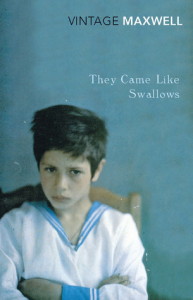
They Came Like Swallows is American author William Maxwell’s second novel. Maxwell was famous as an author and editor. He helped shape the careers of writers like Eudora Welty, John Cheever, John Updike, John O’Hara and many others. I read and reviewed one of his later novels, So Long, See You Tomorrow in the early days of this blog. I was very impressed with it and keen on reading more of his work. Two of his books were suggested in the comments – One was They Came Like Swallows, the other one was The Château. Although I was so keen, it took me eight years to return to him. While I liked So Long, See You Tomorrow more, I found a lot to admire in They came Like Swallows. Once again, it is obvious why he’s called a “writer’s writer”. He’s so skillful.
They Came Like Swallows is a tragic book, even more so because we know it’s based on Maxwell’s childhood story. It’s set at the end of WWI, during the flu pandemic that killed twenty to forty million people. The story is told in three parts, each part told by another narrator. They don’t tell the same story from different angles, but each of them begins, where the other one stops.
Part one is told by eight-year-old Bunny, the younger child of the Morison family. His world turns around his mother and his mother only. He’s a very sensitive child, needs constant encouragement. He also has a keen imagination. Through his eyes we see the world transform into small villages, battles take place, fantastical things happen. His relationship with his older brother Robert is a source of terror. Robert is eight years older than Bunny and has little patience for the kid. At the end of part one, Bunny has been told, his mother’s expecting another child and he has come down with the flu.
Part two is told from Robert’s point of view. The tone is completely different. Robert has sorrows of his own. He’s lost a leg in an accident and tries hard to live a life like any other boy his age. He’s in this in-between state, not a kid anymore, but not yet a grownup. Because his mother had difficult pregnancies in the past, she and the boys’ father leave the kids with an aunt. Robert too, gets the flu and soon they hear that their parents have come down with it as well.
Part three is told from James Morison’s point of view and it’s the most devastating part. It’s obvious from the beginning, the mother will die, it’s only not clear, if anyone else will die, so I’m not going to mention that. The dad’s account is devastating on many levels. He’s lost his wife and the way grief grabs him and threatens to destroy him, is so well described. Equally well described are the reactions of the people who come to the funeral. I always find people are notoriously bad at expressing their sentiments when they hear of someone’s death. All the awkward phrases, the awkward and often unemphatic reactions are captured so well here.
I’m not so keen on stories told by kids usually but it’s done exceptionally well here because William Maxwell uses the kid’s imaginations. He doesn’t try to sound like a child but to let us experience the world through the eyes of a small child and a teenager and, later, a bereaved husband.
Something that struck me was the way the children were treated. Nowadays we have a tendency to treat even small children like grownups and a boy of sixteen would definitely be treated like that. Not so here. The book is eighty years old and to see how much the way we treat children has changed was really interesting.
While I didn’t love this book as much as the last one I read, I’m full of admiration for the craft and looking forward to reading The Château next. And I think it’s an outstanding portrayal of grief and the awkward ways people treat the bereaved. It also shows very well how devastating the pandemic was.
Should you wonder – the title is taken from Coole Park, a poem by William Butler Yeats.
I meditate upon a swallow’s flight,
Upon a aged woman and her house,
A sycamore and lime-tree lost in night
Although that western cloud is luminous,
Great works constructed there in nature’s spite
For scholars and for poets after us,
Thoughts long knitted into a single thought,
A dance-like glory that those walls begot.There Hyde before he had beaten into prose
That noble blade the Muses buckled on,
There one that ruffled in a manly pose
For all his timid heart, there that slow man,
That meditative man, John Synge, and those
Impetuous men, Shawe-Taylor and Hugh Lane,
Found pride established in humility,
A scene well Set and excellent company.They came like swallows and like swallows went,
And yet a woman’s powerful character
Could keep a Swallow to its first intent;
And half a dozen in formation there,
That seemed to whirl upon a compass-point,
Found certainty upon the dreaming air,
The intellectual sweetness of those lines
That cut through time or cross it withershins.Here, traveller, scholar, poet, take your stand
When all those rooms and passages are gone,
When nettles wave upon a shapeless mound
And saplings root among the broken stone,
And dedicate – eyes bent upon the ground,
Back turned upon the brightness of the sun
And all the sensuality of the shade –
A moment’s memory to that laurelled head.
Have you read William Maxwell? Which of his books did you like the most?
